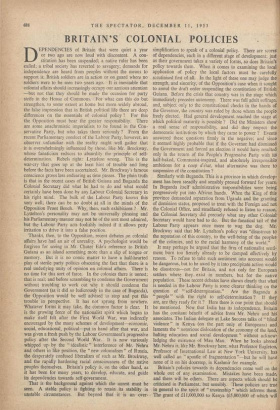BRITAIN'S COLONIAL POLICIES
DEPENDENCIES of Britain that were quiet a year or two ago are now loud with discontent. A con- stitution has been suspended; a native ruler has been exiled; a tribal society has reverted to savagery; demands for independence are heard from peoples without the means to support it; l3ritish soldiers are in action or on guard where no soldiers were to be seen two years ago. It is inevitable that colonial affairs should increasingly occupy our anxious attention —but not that they should be made the occasion for party strife in the House of Commons. For what can this do but strengthen, to some extent at home but more widely abroad, the false impression that in British political life there are deep differences on the essentials of colonial policy ? For this the Opposition must bear the greater responsibility. There are some anachronistic imperialists to be found in the Con- servative Party, but who takes them seriously ? From the recent Parliamentary conduct of the Labour Party, however, an observer unfamiliar with the reality might well gather that it is overwhelmingly influenced by those, like Mr. Brockway, whose fanaticism reduces to absurdity the principle of self- determination. Rebels right: Lyttelton wrong. This is the war-cry that goes up at the least hint of trouble and long before the facts have been ascertained. Mr. Brockway's famous conscience grows less endearing as time passes. The plain truth is that in the recent cases of British Guiana and Buganda the Colonial Secretary did what he had to do and what would certainly have been done by any Labour Colonial Secretary in his right mind. The bulk of the Labour Party knows this very well; there can be no doubt at all in the minds of the Opposition Front Bench. Why, then, such exhibitions ? Mr. Lyttelton's personality may not be universally pleasing and his Parliamentary manner may not be of the sort most admired, but the Labour Party acts foolishly indeed if it allows petty irritation to drive it into a false position.
Thanks, then, to the Opposition, recent debates on colonial affairs have had an air of unreality. A psychologist would be forgiven for seeing in Mr. Chuter Ede's reference to British Guiana as an island something more than a slip of tongue or memory. But it is no comic matter to have a half-hearted play of sterile party politics obscuring the fact that there is a real underlying unity of opinion on colonial affairs. There is no time for this sort of farce. In the colonies there is unrest; that is real; and before scrambling to condemn the Government without troubling to work out why it should condemn the Government (as it did so ludicrously in the case of Buganda), the Opposition would be well advised to stop and put this trouble in perspective. It has not sprung. from nowhere.
Whatever forms it may take, the common factor is clear. It is the growing force of the nationalist spirit which began to make itself felt after the First World War, was indirectly encouraged by the many schemes of development—economic, social, educational, political—put in hand after that war, and was given a fresh push by the Labour Government's progressive policy after the Second World War. It is now variously whipped up by the " idealistic " interference of Mr. Nehru and others in like position, the " new colonialism " of Russia, the desperately confused liberalism of such as Mr. Brockway, and the rapidly hardening racial consciousness of the native peoples themselves. Britain's policy is, on the other hand, as it has been for many years, to develop, educate, and guide its dependencies towards self-government.
That is the background against which the unrest must be seen. A stable policy is fighting to retain its stability in unstable circumstances. But beyond that it is an over- simplification to speak of a colonial policy. There are scores of dependencies, each in a different stage of development; just as their government takes a variety of forms, so does Britain's policy towards them. When it comes to examining the local application of policy the Ideal factors must be- carefully scrutinised first of all. In the light of these one may judge the strength, and sincerity, of the Opposition's case when it sought to annul the draft order suspending the constitution of British Guiana. Before the crisis that country was in the stage which immediately precedes autonomy. There was full adult suffrage, and, subject only to the constitutional checks in the hands of the Governor, the country was ruled by those whom the people freely elected. Had general development reached the stage at which political maturity is possible ? Did the Ministers show a real sense of responsibility, and did they respect the democratic institutions by which they came to power ? Events answered these questions firmly in the negative; and since it seemed highly probable that if the Governor had dismissed the Government and forced an election it would have resulted only in the return of the. People's Progressive Party with its half-baked, Communist-inspired, and absolutely irresponsible ambitions for a coup d'etat, what alternative was there to suspension of the constitution ?
Similarly with Buganda. This is a province in which develop- ment has been steadily and sensibly pressed forward for years.
In Buganda itself administrative responsibilities were being progressively put into African hands. When the King of this province demanded separation from Uganda and the granting of dominion status, proposed to treat with the Foreign and not the Colonial Office, and steadfastly refused to listen to reason, the Colonial Secretary did precisely what any other Colonial Secretary would have had to do. But the fanatical tail of the Labour Party appears once more to wag the dog. Mr. Brockway said that Mr. Lyttelton's policy was "disastrous to the reputation of this country, to the well-being of the peoples of the colonies, and to the racial harmony of the world."
It may perhaps be argued that the fires of nationalist senti- ment burn too fiercely already to be damped effectively by reason. To refuse to take such sentiment into account would be dangerous, but to be awed by it into precipitate action would be disastrous—not for Britain, and not only for European settlers where they exist in numbers, but for the native population. These recent debates have shown clearly that what is needed in the Labour Party is some clearer thinking on the question of " self-deterNination." Are the Baganda a " people " 'with the right to self-determination ? If they are, are they ready for it ? Here there is one point that should be mentioned. Now that India has its independence, Britain has the constant benefit of advice from Mr. Nehru and his associates. The Indian delegate at Lake Success talks of " blind violence" in Kenya (on the part only of Europeans) and, laments the " notorious dislocation of the economy of the land, halting education and social development" without acknow- ledging the existence of Mau Mau. When he looks abroad Mr. Nehru is, like Mr. Brockway 'here, what Professor Eagleton, Professor of International Law at New York University, has well called an " apostle of fragmentation "—but he will have none of it on his doorstep, in Kashmir for example.
Britain's policies towards its dependencies come well on the whole out of any examination. Mistakes have been made, and there will be others. There are aspects which should be criticised in Parliament, but sensibly. These policies are true in general to the spirit of " trusteeship " which informs them. - The grant of £11,000,000 to Kenya (£5,000,000 of which will go to the development of African agriculture during the next five years) is a plain example. Such policies must be main- tained with firmness and tact in the face of nationalism however intemperate, until economic and social development on the one hand and political development on the other meet at the point where power may be handed over to a society mature enough and strong enough to handle it. It is inevitable that societies in evolution will throw up demagogues who will attempt to force the pace. It is inevitable that in Britain there should be those whose moral feelings are, altogether more admirable than the political arguments' into which they cast• them, and who will support such demagogues in their innocence. But they should be kept in their proper place, on the fringe of events.



































 Previous page
Previous page